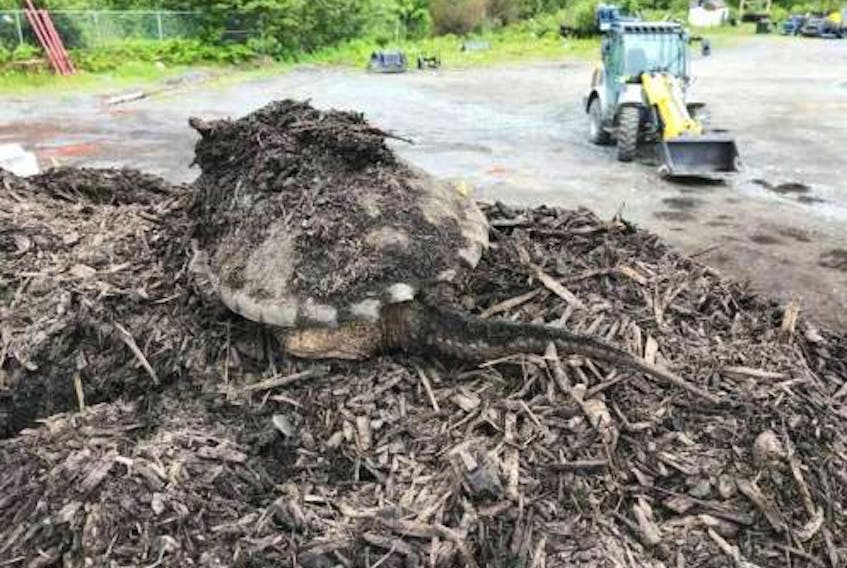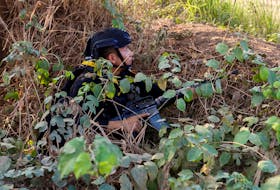Robin Barrett had no idea he was staring at a snapping turtle emerging from a mulch pile, much less a determined mama who had climbed the nine-foot high heap and deposited 42 eggs.
He also had no idea at the time of the rescue he was helping a creature on the vulnerable species list in Nova Scotia.
But Barrett figures it was a small miracle that he arrived at his Lower Sackville business, Barrett Firewood, when he did, at 9 a.m. on July 8. Otherwise, he wouldn’t have seen the turtle leaving her nest and all 42 eggs likely would have been destroyed.
Instead, they arrived at Hope for Wildlife in Seaforth that same day. They remain safe and sound with roughly 160 other turtle eggs at the wildlife rescue sanctuary.
“We’re waiting to see how many hatch and we’re hoping to have a release party,” said Barrett with a laugh. “That was a very lucky turtle and everything lined up, from me seeing her, to having a friend who knew exactly the people to call, to having them show up inside an hour and then delivering them to Hope for Wildlife.
“It was a small-scale miracle. The stars aligned. Everything fell into place to turn what could have been a disaster into a heartwarming story.”
Still mulch-covered, the turtle hadn’t completelyclimbed out of the pile by the time Barrett got an up-close look. Right away he snapped a picture
of the creature and sent it along to his friend — a retired wildlife technician. Knowing the turtle had just deposited her eggs, she instructed him to do nothing until the Turtle Patrol team arrived.
She relayed the discovery to the two-man team, who volunteer their time saving turtle eggs and hatchlings year-round. One of them showed up within the hour and carefully deposited each of the eggs into a mulch-lined crate. Off they went to Hope for Wildlife.
The eggs would have met their demise during a mulch delivery. Or they would have cooked under the summer sun.
Barrett says it’s the same turtle he’s seen on the property roughly twice a year for the past decade. He figures the freshwater creature makes her home between the brook and quarry pond located near the firewood lot.
“I’ve always been impressed by the longevity of turtles and to see a turtle this old always fascinates me, that they can survive. I’m always glad to see them whenever I run into them. They’re one of nature’s wonders.”
Paul Turbitt, a retired IT professional, and biologist Clarence Stevens make up the Turtle Patrol, with a handful of volunteers. The pair scoured snapping turtle habitat in the Halifax area last year, finding 185 hatchlings and delivering them to freshwater homes. Turbitt says because of human encroachment, female turtles have to search further to find appropriate nesting areas. Lakeside areas that used to offer prime sand and fine gravel nesting spots have been replaced by cottages. More humans also mean more raccoons, which feed on the eggs, he said.
That means more turtles are on the move, crossing roadways and putting them in harm’s way.
“In a healthy environment, it takes 1,400 eggs to get you one healthy turtle and already eight adult turtles have been taken out of population this year,” said Turbitt.
“We’re doing irreparable damage to the planet. But I just love snapping turtles. You pick up an energetic hatchling and every claw and every spike on the tail is perfectly formed. They’re amazing creatures,” he said Hope Swinimer, founder of Hope for Wildlife, says she’s thrilled to have more turtle eggs on board. The eggs are expected to hatch after roughly 90 days and like always, they’ll be delivered back to their original habitat.
“We’re going to winter them over and try to keep them so they are a bit bigger, giving them a better chance,” said Swinimer. “It’s a really neat, exciting story of people working together and the turtles would never have survived without them.
“We have quite a turtle hatchery at the farm, having hatched over 500 turtles since we started trying this about a decade ago. We expect 90 per cent will hatch.”








